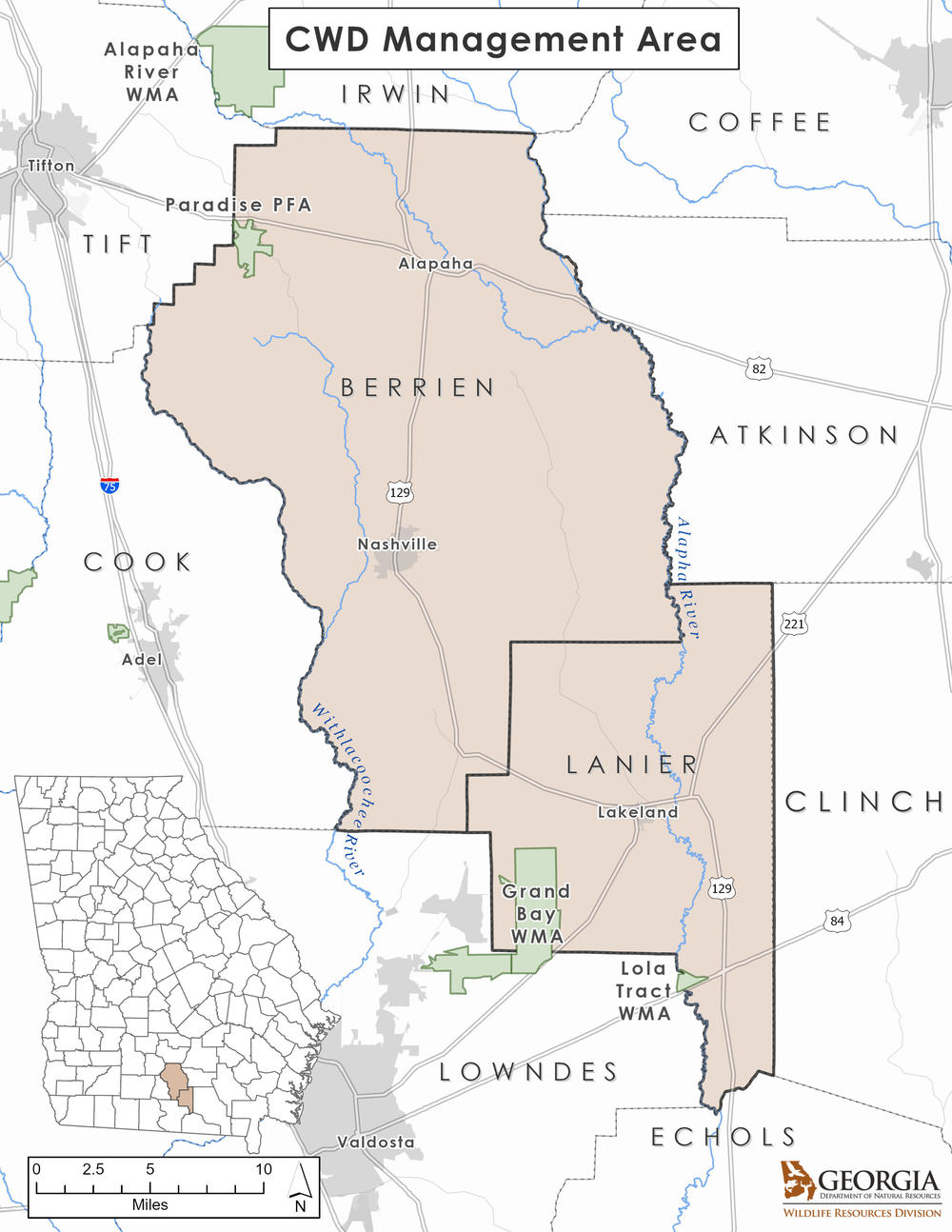
Caption
The chronic wasting disease management area in Georgia as of Jan. 27, 2025.
Credit: Georgia Department of Natural Resources

Georgia’s Department of Natural Resources started routine surveillance for chronic wasting disease in deer over 20 years ago, Assistant Chief of Game Management Tina Johannsen told state lawmakers on Monday.
It wasn’t until last week that surveillance actually found something.
“This deer looked perfectly normal and was harvested by a hunter,” Johannsen said. “It happened to fall into our sampling pool.”
The deer had been harvested in November by a hunter in Lanier County in South Georgia and is the first sample in the state that’s tested positive for chronic wasting disease. CWD is caused by a misfolded protein called a prion, that can accumulate in the brain and cause damage and behavioral changes as the brain turns into spongy matter.
The disease is fatal and has an incubation period of roughly one to three years, meaning most infected deer won’t look sick until far later. CWD has been detected in 36 U.S states and parts of Canada.
Johannsen told state representatives in the House Game, Fish and Parks meeting on Monday that DNR can’t be sure of how the disease made its way into Georgia — Florida had reported a positive case in 2023. It can spread through close contact between deer but also through contact with dead infected deer, or even with the environment they died in.
Georgia restricted the import of deer and elk more than two decades ago.
For now, Johannsen told GPB that people in counties outside the management zone of Lanier and Berrien counties — where DNR is actively conducting more testing using samples from local processors, taxidermists, donated carcasses and roadkill — should not be concerned.
“If they want to pay themselves to have a deer tested just for their own peace of mind or say they, for whatever reason, want to have it tested, they can do that,” Johannsen said about hunters outside of the affected counties.

The chronic wasting disease management area in Georgia as of Jan. 27, 2025.
“They're people with boots on the ground today as we speak,” DNR commissioner Walter Rabon said. “We're up to the challenge that's been posed to us.
Deer hunting in Georgia brings in roughly $1.6 billion dollars a year, and venison is a common source of protein for hunters and other meat-eaters alike.
There have been no reported cases of CWD in people, but the Centers for Disease Control and Prevention says theoretically, if spread were to occur, it could be through the consumption of infected meat.
People who have hunted deer in or around Lanier and Berrien counties can get that harvested deer tested if they have concerns. Since meat cannot be tested specifically, DNR is encouraging that carcasses get sent either to a trusted processor or that heads get brought to drop-off freezers.
Tests cost roughly $25 to $40, though DNR is paying that cost for samples from within the current management area, Johanssen told GPB.
For now, the agency aims to focus on testing deer that are most likely to have been infected through so-called “cluster sampling.”
“We want to work very locally and intensively with those landowners that have positive deer, to remove the ones that are most likely to also be positive,” Johannsen said. That means targeting smaller groups of adult bucks. “This is very much focused at the property level.”
People are also encouraged to report signs of sick deer, which can look slow, zoned out and starving.
The agency will host a series of outreach meetings in the coming weeks in an effort to educate hunters and others on CWD. She told GPB that at this point there are no plans to change hunting regulations for the next season, which starts in September, and that DNR does not plan to “go in there and start shooting deer.”
“The biggest thing is I want to make sure hunters understand that this is serious, but it's not the end of deer hunting,” Johannsen said.
But, with this first positive case and a proven inability nationwide to eradicate the disease, it is something the state will be managing for years to come.